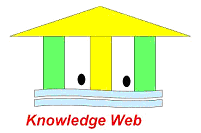
Meaning Coordination and Negotiation
held in conjunction with3rd International Semantic Web Conference (ISWC-2004)
8 November 2004, Hiroshima Prince Hotel, Hiroshima, Japan



|
ISWC-04 Workshop on
Meaning Coordination and Negotiationheld in conjunction with3rd International Semantic Web Conference (ISWC-2004) 8 November 2004, Hiroshima Prince Hotel, Hiroshima, Japan |


|
PRELIMINARY PROGRAM
Electronic Proceedings
One possible approach to this problem is that of creating global schemas (or shared models) onto which local schemas are mapped and thus interoperated. This "centralized" approach may work in restricted environments, like a small corporate Intranet. However, in open environments (like the Web), it does not seem a viable solution, as it can be very difficult to reconciliate/integrate schemas/models that suit different needs in a single shared model; in addition, it would be almost impossible to maintain such a shared model in a highly dynamic environment.
The aim of this workshop is to investigate an alternative approach to semantic interoperation, namely an approach in which no global schemas are presupposed, and schemas/models are directly mapped onto each other in a "peer-to-peer" spirit. A requirement of the aproposed approach is that it must be applicable to scenarios where peers that cannot assess semantic problems by "looking into each other's head", like humans or software agents (what we call semantically autonomous entities).
In this approach, it is possible to distinguish between two different processes:
In game theoretic terms, the first is a coordination problem, as (i) all parties have a common interest in achieving such an agreement, but (ii) there are many possible solutions to the problem, and thus the selection of one of these solutions can be problematic; the second is a negotiation problem, as (i) an agreement is valuable for all parties, but (ii) parties may have conflicting preferences over which solution should be selected, so that every agreement implies that at least someone has to concede to some extent to other party.
The problem of meaning coordination and negotiation can be addressed from many different perspectives, using different conceptual and technological tools, and with different motivations in mind. So we expect that the workshop will attract people from very different fields, such as knowledge representation, ontology engineering, agents, databases, natural language processing, machine learning, game theory, philosophy of language, cognitive linguistics.
Topics of interest include (but are not limited to):
This workshop follows the the AAAI-02 Workshop on Meaning Negotiation (July 28, 2002, Edmonton, Canada). The main feature is that it is an interdisciplinary workshop, in which members of different communities join together to address one of the most challenging issues for the current development of the Semantic Web, and in general of open distributed applications (including web services, knowledge management systems, multi-agent systems, and so on).
July 23, 2004 (NEW): Paper submission September 13, 2004: Notification of acceptance to authors September 24, 2004: Camera-ready version of accepted papers November 8, 2004: Workshop on Meaning Coordination and Negotiation
Paolo Bouquet